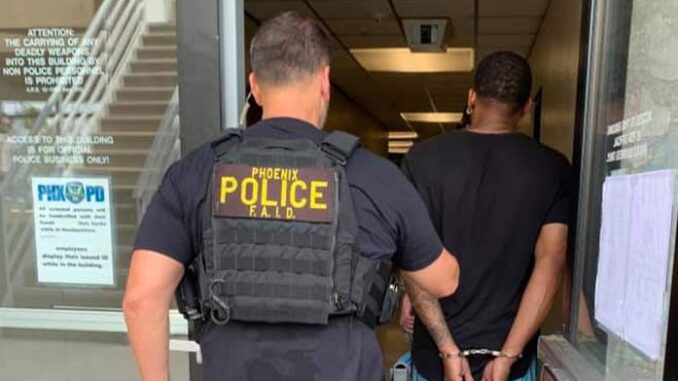
Law enforcement agencies across Arizona are having a hard time finding qualified applicants who want to be officers, deputies, and troopers. The “cop crunch” problem is so bad that recruitment efforts by the City of Phoenix frequently tout how its new officers as the highest paid in Arizona.
So why is Phoenix PD making it more unattractive to be a police officer when the agency has hundreds of vacant positions that negatively impact response times?
Phoenix PD has roughly 2,700 sworn officers, although less than one-half of those are assigned to respond to calls for service, engage in community policing activities, and investigate violent crimes. Many more positions remain unfilled because vacancies cannot be filled as fast as they are created through retirements and other resignations.
And it is only going to get worse if city officials and residents do not put the cuffs on a controversial proposal by Interim Chief Michael Sullivan to overhaul the department’s Use of Force policy, according to several officers and former officers.
Public records show Sullivan, who came to Phoenix from Baltimore last October under a one-year contract, is prohibited under his restricted certification “from being assigned any duty likely to result in the need to apply physical force.”
READ MORE ABOUT SULLIVAN’S RESTRICTION:
New Phoenix Police Chief Sworn-In But Can’t Be Assigned Some Typical Duties
Yet despite the restriction on his own police duties, Sullivan is seeking to implement stricter criteria for when Phoenix officers may use force even if an officer’s conduct otherwise complies with the long established “objectively reasonable” standard set by the U.S. Supreme Court’s groundbreaking 1989 decision in Graham v Connor.
The draft policy essentially shifts the burden to an officer to show after the fact that any use of force was not only reasonable but also “necessary and proportional.”
Critics of Sullivan’s proposed policy say he is making police work even more unattractive to recruits at a time when the City of Phoenix is often unable to timely respond to serious calls for service. The policy is also going to put the public and officers at more risk, they say.
Discarding the objective and legally acceptable standard in Graham v Connor in favor of a subjective administrative policy created by Sullivan is “untenable,” according to Mark Spencer, a former Phoenix officer who now works for Judicial Watch, a conservative, non-partisan educational foundation that promotes transparency, accountability and integrity in government, politics and the law.
Spencer wore a Phoenix PD badge for more than 25 years and held various positions with the Phoenix Law Enforcement Association. He fears Sullivan’s reworking of the policy will push otherwise good officers to disengage from proactive policing.
“It fuels the strategy of poor police work, as you never get in trouble for doing nothing,” he told Arizona Daily Independent.
Spencer is also concerned Sullivan’s proposal will cause officers to hesitate when under threat due to worry their split second choice of response will be unduly second guessed. He also questions the heavy emphasis Sullivan puts on pushing officers to retreat from some situations that might otherwise justifiably call for a use of force.
The changes, says Spencer, could put residents and officers at higher risk and turn Phoenix PD into something that looks akin to third world policing.
“When police officers are coerced by management into disengaging, and in fact ‘retreating’ becomes par for the course, who then are we paying to run to gunfights?” Spencer asks. “The danger for citizens increases while the quality of life in communities decreases.
